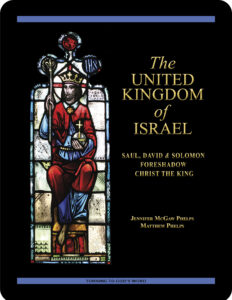 The United Kingdom of Israel:
The United Kingdom of Israel:
Saul, David & Solomon
Foreshadow Christ the King
Lesson 4 God Regrets Making Saul King
the First Book of Samuel 14:1—15:35
Revised Standard Version Catholic Edition (RSVCE)*
New American Bible Revised Edition (NABRE)*
Catechism of the Catholic Church
ex libris (in our library)
glossary for The United Kingdom of Israel
cross references in The United Kingdom of Israel
next lesson: David Is Anointed by Samuel
This material coordinates with Lesson 4 on pages 24–30 in The United Kingdom of Israel: Saul, David & Solomon Foreshadow Christ the King.
“When your days are fulfilled and you lie down with your fathers, I will raise up your offspring after you, who shall come forth from your body, and I will establish his kingdom. He shall build a house for my name, and I will establish the throne of his kingdom for ever.”
—the Second Book of Samuel 7:12–13
welcome to our in-depth study of Saul, David & Solomon
We invite interested groups and individuals to check out the sample first lesson from this 28- lesson
lesson  Turning to God’s Word Catholic Bible study. These online study pages link to our free lesson videos, as well as to a glossary and cross references in the biblical text. Other study aids include maps, additional commentary, and prayers based on the primary Scripture in each lesson. The United Kingdom of Israel: Saul, David & Solomon Foreshadow Christ the King has been granted an imprimatur and may be purchased from our website shop. If you have a Bible-study question or comment, click on the “ask us your question” or “what do you think” button on any study page.
Turning to God’s Word Catholic Bible study. These online study pages link to our free lesson videos, as well as to a glossary and cross references in the biblical text. Other study aids include maps, additional commentary, and prayers based on the primary Scripture in each lesson. The United Kingdom of Israel: Saul, David & Solomon Foreshadow Christ the King has been granted an imprimatur and may be purchased from our website shop. If you have a Bible-study question or comment, click on the “ask us your question” or “what do you think” button on any study page.
open with prayer
It’s always wise to begin any Bible study with prayer, whether reading the Scriptures alone or meeting with others in a discussion study group. You can pray using your own words or use one of the opening prayers on our website. We especially like the following:
Lord Jesus, you promised to send your Holy Spirit
to teach us all things.
As we read and study your word today,
allow it to touch our hearts and change our lives. Amen.
let’s review—the First Book of Samuel 12:1—13:23
In Lesson 3 Saul Displeases the LORD, Samuel asks the people to testify that he’s never defrauded them or oppressed them or taken anything as a bribe. The people agree that he hasn’t behaved in an unjust manner. Samuel then outlines a history of the LORD’s saving deeds and reiterates that the people have chosen a king to rule over them. He says that if the king and the people will follow the LORD, all will be well. If not, the hand of the LORD will be against them and their king. The LORD then displays his power in a violent thunderstorm. The people ask Samuel to pray for them, which he agrees to do. Samuel also says that he’ll instruct the people about how to follow the LORD. An indeterminate period of time passes. The Philistines muster a large number of troops against Saul, who’s encamped at Gilgal waiting for Samuel. When Samuel doesn’t appear in seven days, Saul makes an offering to the LORD. Samuel immediately arrives and announces that had Saul waited as the LORD commanded, then God would have established Saul’s reign over Israel forever. Since Saul didn’t obey, God has sought out a man after his own heart to rule the people. Saul numbers the people who are with him preparing to fight the Philistines. The only descendants of Jacob with proper weapons are Saul and his son Jonathan.
map notes—Zobah, Havilah & Shur
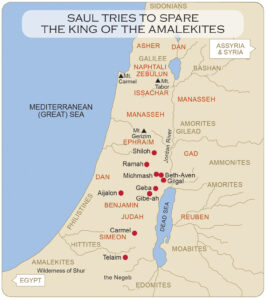 Zobah is a region believed to have been located along the northern border of the land of Canaan that was allotted by God to the descendants of Jacob. It was near the territories settled by the tribes of Dan and Asher. Moving toward Assyria, Havilah is located east of the territory settled by the half-tribe of Manasseh. Shur is a desert region located southwest of the land of Canaan allotted by God to the descendants of Jacob. Shur was near territories settled by the tribes of Judah and Simeon. A description of the locations of places that don’t appear on the map can be found in the glossary. Click on the map (right) to enlarge it. The original map is on page 29 in The United Kingdom of Israel: Saul, David & Solomon Foreshadow Christ the King.
Zobah is a region believed to have been located along the northern border of the land of Canaan that was allotted by God to the descendants of Jacob. It was near the territories settled by the tribes of Dan and Asher. Moving toward Assyria, Havilah is located east of the territory settled by the half-tribe of Manasseh. Shur is a desert region located southwest of the land of Canaan allotted by God to the descendants of Jacob. Shur was near territories settled by the tribes of Judah and Simeon. A description of the locations of places that don’t appear on the map can be found in the glossary. Click on the map (right) to enlarge it. The original map is on page 29 in The United Kingdom of Israel: Saul, David & Solomon Foreshadow Christ the King.
 it’s easy to see things from Saul’s point of view (36:22)
it’s easy to see things from Saul’s point of view (36:22)
In the video overview for Lesson 4 in this Bible study, “God Regrets Making Saul  King,” the LORD decides that Saul hasn’t been behaving in the way that God had hoped. The LORD loses little time in determining a replacement for Saul, although the prophet Samuel isn’t immediately crazy about anointing another king. Turning to God’s Word author Matthew Phelps points out that in deciding not to follow God’s exact instructions concerning the ban on the Amalekites, Saul behaves in a very human fashion. It’s not
King,” the LORD decides that Saul hasn’t been behaving in the way that God had hoped. The LORD loses little time in determining a replacement for Saul, although the prophet Samuel isn’t immediately crazy about anointing another king. Turning to God’s Word author Matthew Phelps points out that in deciding not to follow God’s exact instructions concerning the ban on the Amalekites, Saul behaves in a very human fashion. It’s not  infrequent for individual men and women to determine that they have a better idea about how to handle a given situation than God does. How do you think that this usually works out? When was the last time that you disagreed with God about your life? How has that worked out for you?
infrequent for individual men and women to determine that they have a better idea about how to handle a given situation than God does. How do you think that this usually works out? When was the last time that you disagreed with God about your life? How has that worked out for you?
The Scripture ranges for the videos that accompany this Catholic Bible study match the Scripture ranges for the sets of questions in The United Kingdom of Israel: Saul, David & Solomon Foreshadow Christ the King. You can follow along as Turning to God’s Word author Matthew Phelps discusses Lesson 4, “God Regrets Making Saul King,” on pages 24–30 in the study book.
some priestly history
The First Book of Samuel 14:1–3 contains a brief genealogy for Ahijah, the priest attached to Saul and the 600 men encamped outside of Gibe-ah to oppose the Philistines. This lineage establishes Ahijah as a legitimate priest in the line of Eli, who served the LORD at Shiloh. Prior to David’s conquest of Jerusalem, Shiloh was a major religious center for the descendants of Jacob. Members of Eli’s priestly line are doomed, however, based on prophecy in the First Book of Samuel 2:12–36. Eli and his sons have in fact already died. The fourth chapter in the First Book of Samuel records the details, and well as the circumstances surrounding the birth of Ichabod, who is listed as the uncle of Ahijah in the genealogy in the fourteenth chapter in the First Book of Samuel.
Jonathan’s character
In contrast to his father Saul, Jonathan is depicted in Scripture as a person of great bravery who also possesses no small amount of wisdom. The First Book of Samuel 14:1–15 describes Jonathan staging a daring and successful two-man attack on a garrison of Philistines. The key to this victory is understood to be Jonathan’s unwavering faith in the LORD’s protection. Jonathan’s wisdom is apparent in the First Book of Samuel 14:29–30, in which he criticizes his father’s rash oath. Jonathan’s bravery and courage are established beyond any shadow of doubt in the First Book of Samuel 14:43, in which he appears willing to die in order to fulfill the terms of the oath of which he’s been so critical.
biblical vocabulary—ransom
The First Book of Samuel 14:45 records that the people ransom Jonathan from death after it’s been determined that he failed to honor his father’s rash oath. The use of the word ransom in that instance is a bit unusual. The Latin and Greek roots of the word mean “buy back,” but in Hebrew the word means “sever.” So in this case, when the people ransom Jonathan, it might simply mean that the people bring about Jonathan’s release. The biblical text is unclear about whether the people offer anything in return, but it’s certainly possible that they offered some sort of animal sacrifice to God to take the place of sacrificing Jonathan’s life since making such deal with God was religious practice at the time.
pray with the Psalms—reliance on God in battle
The First Book of Samuel 14:1–15 describes Jonathan’s total reliance on God’s assistance when he and  his armor-bearer battle the Philistines. The history of the Israelites is marked by confidence that the LORD will protect them from all of their enemies. Psalm 149 praises God for aiding his people when they are oppressed—but the final verse includes the caution that the LORD’s help is reserved for those who are faithful. Prayed at Sunday Lauds (Week I), Psalm 149 is included as part of Lesson 2 O God, at Dawn I Seek You in the Turning to
his armor-bearer battle the Philistines. The history of the Israelites is marked by confidence that the LORD will protect them from all of their enemies. Psalm 149 praises God for aiding his people when they are oppressed—but the final verse includes the caution that the LORD’s help is reserved for those who are faithful. Prayed at Sunday Lauds (Week I), Psalm 149 is included as part of Lesson 2 O God, at Dawn I Seek You in the Turning to  God’s Word Catholic Bible study Sing a New Psalm: Communicating with God Through the Prayers of the Church—Volume I: Lauds & Vespers.
God’s Word Catholic Bible study Sing a New Psalm: Communicating with God Through the Prayers of the Church—Volume I: Lauds & Vespers.
Saul has a few problems
The fourteenth chapter in the First Book of Samuel continues to emphasize Saul’s ineptness as a military leader. His rash oath flies in the face of the common-sense adage that an army marches on its stomach. By insisting that his troops not eat, Saul puts his entire campaign at risk. The First Book of Samuel 14:35 suggests that Saul isn’t particularly devout, either. It contains the only mention of Saul building an altar to the LORD. The First Book of Samuel 15:12, however, later records Saul setting up a monument for himself at Carmel, suggesting that Saul has high regard for his own accomplishments.
a matter of life & death
“The People Sin by Consuming Blood,” commentary on page 30 in The United Kingdom of Israel: Saul, David & Solomon Foreshadow Christ the King, addresses the Old Testament injunction against consuming blood and helps to explain why, in the sixth chapter in the Gospel According to John, people are so horrified when Jesus insists that his followers must eat his flesh and drink his blood. The book of Leviticus 17:11 refers to the theology behind Old Testament animal sacrifices, but it also can be read by Christians as an eerie foreshadowing of the sacrament of the Eucharist: “For the life of the flesh is in the blood; and I have given it for you upon the altar to make atonement for your souls … .” Learn what  Jesus taught regarding the Eucharist in Lesson 8 I Am the Living Bread in the Turning to God’s Word Catholic Bible study The Gospel According to John: An Encounter with Grace & Truth.
Jesus taught regarding the Eucharist in Lesson 8 I Am the Living Bread in the Turning to God’s Word Catholic Bible study The Gospel According to John: An Encounter with Grace & Truth.
‘eat my flesh’—you could look it up in our archives
Looking at the First Book of Samuel 14:31–33 opens a door to more consideration of Jesus’ Bread of  Life discourse in the Gospel According to John. From the time when Jesus issued this teaching, it’s engendered controversy. By reading Lost in Translation, an online column in which Turning to God’s Word author Matthew Phelps helps readers connect with ideas expressed in the original languages of the Scriptures, you can learn more about the interesting language Jesus that uses when he instructs his followers: “Eat my flesh.” New Lost in Translation entries are posted on Mondays, and past entries are archived on our website. Contact us if you’d like to receive Lost in Translation by email every week.
Life discourse in the Gospel According to John. From the time when Jesus issued this teaching, it’s engendered controversy. By reading Lost in Translation, an online column in which Turning to God’s Word author Matthew Phelps helps readers connect with ideas expressed in the original languages of the Scriptures, you can learn more about the interesting language Jesus that uses when he instructs his followers: “Eat my flesh.” New Lost in Translation entries are posted on Mondays, and past entries are archived on our website. Contact us if you’d like to receive Lost in Translation by email every week.
biblical vocabulary—urim & thummim
Saul turns to urim and thummim in the First Book of Samuel 14:41 to learn why God isn’t responding to his inquiry about whether he will be successful in battle with the Philistines. The book of Exodus 28:30 describes urim and thummim being associated with the priesthood. You can learn more about how scholars believe these were used by the descendants of Jacob—and a possible explanation for why this method of communicating with God faded from use around the time that the monarchy was instituted—in the commentary “Urim & Thummim” on page 28 in The United Kingdom of Israel: Saul, David & Solomon Foreshadow Christ the King.
who are the Amalekites & the Kenites?
The harsh punishment the LORD decrees for the Amalekites is based on their past behavior toward the  descendants of Jacob, which is described in the book of Exodus 17:8–16. The Kenites are exempted from the ban because of their longstanding friendship with God’s people. You can learn more about the origin of these two groups in the online glossary.
descendants of Jacob, which is described in the book of Exodus 17:8–16. The Kenites are exempted from the ban because of their longstanding friendship with God’s people. You can learn more about the origin of these two groups in the online glossary.
a closer look at the Old Testament ban
The violence associated with the Old Testament idea of the ban challenges present-day readers. The Hebrew term, ḥērem, means “devote” or “destroy.” It can be best understood as a mode of rendering harmless anything threatening the religious life of the descendants of Jacob. The twentieth chapter in the book of Deuteronomy identifies six groups who were to be placed under the ban—the Hittites, Amorites, Canaanites, Perizzites, Hivites, and Jebusites. These all were peoples who had settled the land of Canaan prior to the arrival of the descendants of Jacob.
The ban appears most often in the Book of Joshua, especially in connection with the total destruction of the cities of Jericho and Ai. The ban also shows up in the fifteenth chapter in the First Book of Samuel, which describes how Saul and his army destroy almost all of the people and possessions in Amalek, but spare the king and the best of the sheep, oxen, fat calves, and lambs. As a result, in the First Book of Samuel 15:17–23, Saul is rebuked by Samuel for ignoring God’s commandment to utterly destroy all of the Amalekites as well as all of the Amalekites’ possessions. Consider whether Saul might have had a private and personal motivation when he decided to spare Agag, the king of Amalek.
The thirteenth chapter in the First Book of Samuel recorded Saul’s previous transgression in connection with improperly offering sacrifice. It’s difficult to know whether Saul lands in hot water as a result of taking it upon himself to present a burnt offering or as a result of ignoring instructions to utterly destroy Amalek. What’s clear, however, is that Saul has flouted the religious authority of the LORD’s prophet. To emphasize the seriousness of the situation, which costs Saul the kingdom, the First Book of Samuel 15:33 records: “And Samuel hewed Agag in pieces before the LORD in Gilgal.”
WHAT DO YOU THINK about a Christian interpretation of the ban?
It can be useful to look at the Old Testament ban as a commandment to separate ourselves from anything likely to tempt us to sin. You can learn more in “Destroy Sinful Influences,” the commentary on page 29 in The United Kingdom of Israel: Saul, David & Solomon Foreshadow Christ the King.
? It’s relatively easy to see the wisdom of destroying one’s enemies. It’s more difficult to understand why the LORD requires such violent action when  the descendants of Jacob first arrive in the Promised Land. What reasons can you think of that suggest ways in which the inhabitants of the land of Canaan might pose a threat to God’s people?
the descendants of Jacob first arrive in the Promised Land. What reasons can you think of that suggest ways in which the inhabitants of the land of Canaan might pose a threat to God’s people?
? How does the present-day political situation in the Middle East argue in favor of the Old Testament ban?
? How does it argue against it?
? Based on your knowledge of the Gospels, what position do you think that Jesus would take concerning use of the ban in the present day?
? The Turning to God’s Word Catholic Bible study The Revelation of Jesus Christ: The Faithful Witness  takes an in-depth look at the apocalyptic final book of the New Testament. Consider whether the visions in book of Revelation might lead to a different answer to the previous question.
takes an in-depth look at the apocalyptic final book of the New Testament. Consider whether the visions in book of Revelation might lead to a different answer to the previous question.
? Why do you think the LORD asked his people to destroy all of the property belonging to their enemies?
? What possible harm could come from making personal use of material things?
? What people and things might interfere with or threaten your relationship with the LORD?
? Consider whether you should limit your exposure to any such things that might be spiritually harmful.
Saul is rejected as king
The First Book of Samuel 15:23 is the only place in Scripture that records Samuel using Saul’s name and the word king in the same sentence. It’s probably significant that this occurs when Samuel announces that the LORD has rejected Saul as king.
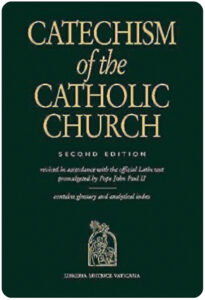 the best Catholic commentary about Scripture
the best Catholic commentary about Scripture
To find out more about how Church teaching is supported by Scripture passages in The United Kingdom of Israel: Saul, David & Solomon Foreshadow Christ the King, check out the Index of Citations in the Catechism of the Catholic Church. Links (Revised Standard Version Catholic Edition [RSVCE*]) to the primary Scripture passages in the lesson and relevant paragraphs in the Catechism are provided here. Not every passage in the biblical text for this Catholic study is referenced in a Catechism paragraph, however, including the passage in this lesson from the First Book of Samuel 14:1—15:35.
ways our glossary might prove helpful
In addition to providing extra information about geographical locations, our glossary also points out  persons and places mentioned in the biblical text under multiple names or spellings. If you can remember a name but aren’t sure in which lesson it shows up, you can find it in the glossary, which lists every proper noun that appears in the primary biblical text for The United Kingdom of Israel: Saul, David & Solomon Foreshadow Christ the King.
persons and places mentioned in the biblical text under multiple names or spellings. If you can remember a name but aren’t sure in which lesson it shows up, you can find it in the glossary, which lists every proper noun that appears in the primary biblical text for The United Kingdom of Israel: Saul, David & Solomon Foreshadow Christ the King.
to learn more, read more Scripture
If you’re having difficulty with a particular passage of Scripture, it can be helpful to read the relevant  cross references—but looking these up can take time. To make that easier, we’ve compiled the cross references from the Revised Standard Version Second Catholic Edition (RSV2CE)—the translation that we reprint in our study books. That list can be found at the top of every online study page, and it includes links to cross references in the primary biblical text for The United Kingdom of Israel: Saul, David & Solomon Foreshadow Christ the King.
cross references—but looking these up can take time. To make that easier, we’ve compiled the cross references from the Revised Standard Version Second Catholic Edition (RSV2CE)—the translation that we reprint in our study books. That list can be found at the top of every online study page, and it includes links to cross references in the primary biblical text for The United Kingdom of Israel: Saul, David & Solomon Foreshadow Christ the King.
don’t forget about our indexes & extra online material

 If you’re trying to locate information about a specific Scripture passage, you can look it up in the index at the back of the study book or sample lesson. If you want to find a particular commentary, you can look up its title in the topics index. To learn more about another book of the Bible for which there’s a Turning to God’s Word study, visit the online study directories to read the commentaries and watch any accompanying videos. Finally, if you have a question or would like to make a comment about any of our studies, you can use one of the “ask us your question” or “what do you think” buttons to email our authors.
If you’re trying to locate information about a specific Scripture passage, you can look it up in the index at the back of the study book or sample lesson. If you want to find a particular commentary, you can look up its title in the topics index. To learn more about another book of the Bible for which there’s a Turning to God’s Word study, visit the online study directories to read the commentaries and watch any accompanying videos. Finally, if you have a question or would like to make a comment about any of our studies, you can use one of the “ask us your question” or “what do you think” buttons to email our authors.
ex libris—Church documents & books about religious topics
Link to magisterial documents referred to in our Bible studies at ex libris—magisterial documents.  This listing includes significant recent encyclicals as well as a number of historical Church documents. Recommended books related to Scripture study can be found at ex libris—main bookshelf.
This listing includes significant recent encyclicals as well as a number of historical Church documents. Recommended books related to Scripture study can be found at ex libris—main bookshelf.
wondering how to pronounce some of these words?
The following link is to a reading from the New International Version (NIV) Bible. To listen, click on the audio icon above the printed text. Although not taken from the translations used in our study materials, the NIV reading provides an audio guide to pronunciation of words in this lesson’s primary biblical text. A close online version of the translation of the Bible used in Catholic liturgy in the United States as well as an audio guide for daily Mass readings for the current month can be found on the website of the United States Conference of Catholic Bishops (USCCB).
the First Book of Samuel 14:1—15:35 (NIV)
 close with Bible-based prayer related to this lesson
close with Bible-based prayer related to this lesson
Many of our Catholic study groups like to conclude their discussions with a prayer based on the scriptural focus of their lesson, and some participants include Scripture-specific prayer in their individual study. If you’re uncomfortable composing your own Bible-based prayers you can follow our four easy steps. If you prefer, you can use the following prayer based on the biblical text in this lesson in the study book The United Kingdom of Israel: Saul, David & Solomon Foreshadow Christ the King.
O God, you delight in your people’s obedience
more than in burnt offerings and sacrifices.
Teach us to be eager to obey your commandments,
even when to do so seems to fly in the face of what we think best.
We ask this in the name of your Son, Jesus,
who taught that the LORD desires mercy more than sacrifice,
and knowledge of God more than burnt offerings. Amen.
Lesson 5 David Is Anointed by Samuel—the First Book of Samuel 16:1—17:58
Lesson 3 Saul Displeases the LORD—the First Book of Samuel 12:1—13:23
you also may like our two-part study of the prophets
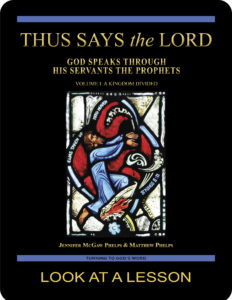
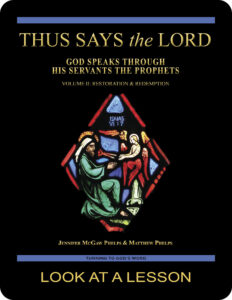 Thus Says the LORD: God Speaks Through His Servants the Prophets—Volume I: A Kingdom Divided examines the prophets in their historical context using the First and Second Books of the Kings and other Old Testament passages written before the Babylonian Exile in 586 B.C. Volume II: Restoration & Redemption looks at the post-exilic prophets. This 51-lesson Catholic Bible study builds on The United Kingdom of Israel: Saul, David & Solomon Foreshadow Christ the King. Click on the books’ covers to view a sample lesson from each volume.
Thus Says the LORD: God Speaks Through His Servants the Prophets—Volume I: A Kingdom Divided examines the prophets in their historical context using the First and Second Books of the Kings and other Old Testament passages written before the Babylonian Exile in 586 B.C. Volume II: Restoration & Redemption looks at the post-exilic prophets. This 51-lesson Catholic Bible study builds on The United Kingdom of Israel: Saul, David & Solomon Foreshadow Christ the King. Click on the books’ covers to view a sample lesson from each volume.
start a Turning to God’s Word Bible study
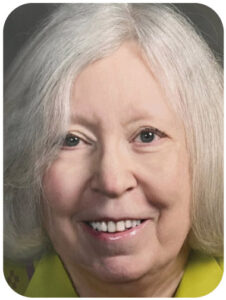 Thank you for your interest in The United Kingdom of Israel: Saul, David & Solomon Foreshadow Christ the King.
Thank you for your interest in The United Kingdom of Israel: Saul, David & Solomon Foreshadow Christ the King.  Information about beginning a Turning to God’s Word Bible study can be found at start a Bible study. Tami, Matthew, and I are available to answer questions. Contact us if you’d like to start one of our studies or have your schedule listed with other TtGW study groups on our website. —Jennifer
Information about beginning a Turning to God’s Word Bible study can be found at start a Bible study. Tami, Matthew, and I are available to answer questions. Contact us if you’d like to start one of our studies or have your schedule listed with other TtGW study groups on our website. —Jennifer
*There are seven deuterocanonical books in the Old Testament—the Books of Tobit, Judith, Wisdom, Sirach, Baruch, and First and Second Maccabees, as well as some passages in the Books of Esther and Daniel. Protestants usually refer to these works as “apocryphal,” a word that means “outside the (Protestant) canon” because they’re excluded from most Protestant Bibles. The word “deuterocanonical” means “second canon”; Catholics use that word to refer to any section of the Catholic Old Testament for which there are no extant, or existing, Hebrew manuscripts. All of the deuterocanonical books appear in the Septuagint, the earliest remaining versions of which date to the 1st century B.C. This Greek translation of the Old Testament was in common use by Jews at the time of Jesus—but the same books aren’t found in existing Hebrew manuscripts, which aren’t as old as the oldest version of the Septuagint. Learn more by reading How Do Catholic & Protestant Bibles Differ?
Turning to God’s Word printed Bible studies use the 2006 Revised Standard Version Second Catholic Edition (RSV2CE) translation for all Scripture references except those to the Psalms, which are taken from The Abbey Psalms and Canticles, prepared by the Benedictine monks of Conception Abbey and published in 2020 by the United States Conference of Catholic Bishops (USCCB). All Scripture links for the online study pages for The United Kingdom of Israel: Saul, David & Solomon Foreshadow Christ the King are to the 1966 Revised Standard Version Catholic Edition (RSVCE) translation. The New International Version (NIV) audio recordings follow the same chapter and verse numbering as the RSV Catholic translations, but the NIV translation doesn’t include the deuterocanonical books and passages.
The 1966 RSVCE uses archaic pronouns and verb forms such as “thee,” “thou,” “didst” in the Psalms and in direct quotations attributed to God. The 2006 RSV2CE replaces those with more accessible English. The few significant translation changes in the RSV2CE include rendering almah as “virgin” in the Book of Isaiah 7:14 and restoring the term “begotten” in the Gospel According to John 3:16.
Numbering varies for some passages in this Bible study. Turning to God’s Word studies (print and digital) follow the numbering in the Revised Standard Version Catholic translations (RSV2CE and RSVCE). Discrepancies in the New American Bible Revised Edition (NABRE) are noted in the Index of Scripture Citations in the study book and the online sample.
 You can learn more about the Psalms by viewing a sample lesson from the Turning to God’s Word Catholic Bible study Sing a New Psalm: Communicating with God Through the Prayers of the Church—Volume I: Lauds & Vespers. The second part of that study, Sing a New Psalm: Communicating with God Through the Prayers of the Church—Volume II: Vigils, Day Prayer & Compline, is scheduled for publication in 2025. Some verse numbers may vary in different translations of the Psalms.
You can learn more about the Psalms by viewing a sample lesson from the Turning to God’s Word Catholic Bible study Sing a New Psalm: Communicating with God Through the Prayers of the Church—Volume I: Lauds & Vespers. The second part of that study, Sing a New Psalm: Communicating with God Through the Prayers of the Church—Volume II: Vigils, Day Prayer & Compline, is scheduled for publication in 2025. Some verse numbers may vary in different translations of the Psalms.
